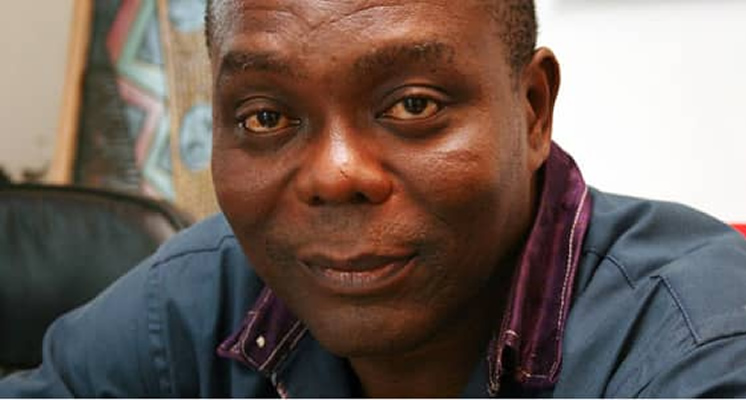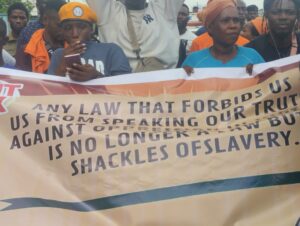Maxim Uzoatu
The talk of the President Bola Ahmed Tinubu regime offering palliatives to cushion the effects of poverty following the abrupt removal of fuel subsidy is not cool by me. The chorus singers of the government are up in song praising the Tinubu administration’s promise of releasing N500 billion to share out to 12 million poor families at the rate of N8,000 per month. Giving the way Nigeria works, I think this will go down the drain as corruption money for the boys.
For starters, there are no guaranteed data for the poor Nigerians who ought to get the money, just like it happened with the TraderMoni shared out by the expired General Muhammadu Buhari regime. There are no guarantees that Tinubu’s palliatives will eventually go to the poor people it’s meant for.
The country is getting mired further into debt because in lieu of the palliatives the government got the approval of the National Assembly to borrow a hefty $800 million loan from the World Bank. There is even the matter of the N819 billion supplementary budget. Do we question the N70 billion to support the buying of super-duper SUVs and sundry appurtenances for the luxuries of the Senators and House of Assembly members? Even the National Judicial Council (NJC) got a package totalling N35 billion.
The so-called poorest of the poor families who stand to benefit from the N8,000 Naira monthly palliative are somewhat expected to scream alleluia because the money amounts to a paltry N53 per day! The value of the naira is depreciating calamitously against the US Dollar such that the money promised is absolutely worth nothing in the circumstances.
The truth is that the Tinubu regime is obeying the neo-market promptings of the IMF and the World Bank. It is little wonder that the British government is already praising the policy. It was the same thing that happened when General Ibrahim Babangida completely devalued Nigerian lives through the Structural Adjustment Programme (SAP) that the then British Prime Minister, Dame Margret Thatcher touted as the sure-fire survival stratagem for all African countries.
Nigerians have been goaded toward floating the hapless naira in the market, and the currency has been blown away by the currents. With the surreptitious devaluation of the naira, the poor Nigerian families can hardly breathe. Dangling the N8,000 monthly mirage amounts to just another tale by the moonlight.
Going back to the immediate past Buhari regime, there was the much ballyhooed National Social Investment Programme (NSIP) established in 2016 to address poverty in Nigeria. There were a melange of alphabet soup programmes under the policy such as N-Power, CCT, Government Enterprise and Empowerment Programme (GEEP), and the National Home Grown School Feeding Programme (NHGSFP). The jury is out if any of these programmes amounted to anything in the end toward addressing pervasive poverty and hunger in Nigeria.
A major player of the ancien regime in the shape and size of the then Minister of Humanitarian Affairs, Disaster Management and Social Development, Hajiya Sadiya Umar Farouk, had revealed that the government she served put in the humungous sum of N1.358 trillion in the ill-assorted programmes making up the NSIP from 2016 to 2022. The 15 million poor Nigerians she claimed to have impacted upon are neither here nor there. It just was a pathetic exercise of shelling out a paltry N5,000 for some showpiece poor charlatans. That surely is not a praiseworthy way to address poverty in any society that wants to have anything to do with progress.
There is no gainsaying that the Tinubu administration is carrying forward what Buhari started. The Renewed Hope promised by the regime happens to be just a throwback to the Next Level postulations of Buhari time. It is of course to be understood that it is still the same party, the All Progressives Congress (APC) that is in power in Nigeria, so there should be a measure of policy continuity. What rankles though is the pretension that the Tinubu regime is of a different hue.
Nigeria is alarmingly on a downward spiral. The talk of palliatives does not in any way address the fundamental issues that must be done for Nigeria to survive. The old notion of teaching people how to fish supervenes over dashing out fish to the people.
Incidentally, Tinubu always stresses that he is a product of the welfare system enunciated by the legendary Chief Obafemi Awolowo of the old Western Region. He even ups the ante by saying that the Hope promise Chief MKO Abiola would have offered Nigerians via the annulled 1993 elections has been re-packaged by him as Renewed Hope. The current direction of his government’s policies do not at all go in the direction of the touted forebears.
What needs to be done is an aggressive solving of social problems by the government. With the consistent devaluation of the naira, fuel price stands to continue to go higher. Fixing the refineries remains the best option to pull Nigeria out of the bad patch of always depending on dollar-denominated fuel importation.
The mammoth N500 billion that is in danger of being swindled by looting experts in the corridors of power, against the advertised purpose of palliatives for the poor, should be expended on fixing refineries, addressing health facilities, funding education, and providing affordable transportation in the meantime.
Government by magic ought to stop if Nigeria is to survive. Going the accursed way of mouthing the provision of dubious palliatives can only lead to national perdition.










More Stories
Manchester City survive Brugge scare to set up Bayern Munich or Real Madrid tie
Arne Slot to rest nine senior Liverpool players in Champions League shuffle
Women’s Super League: talking points from the weekend’s action